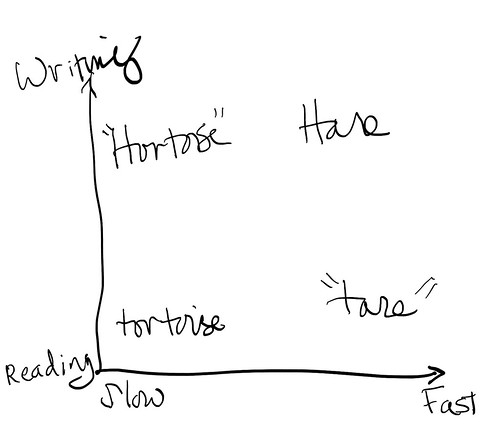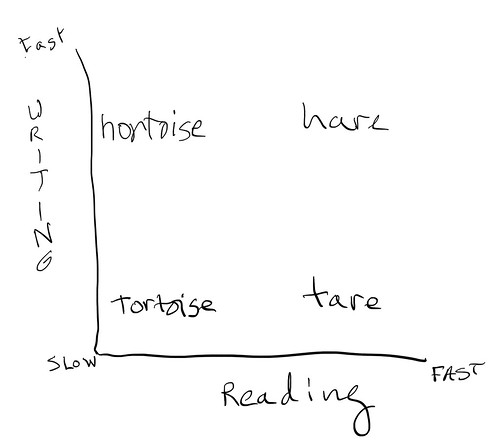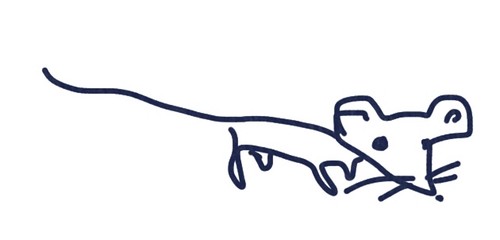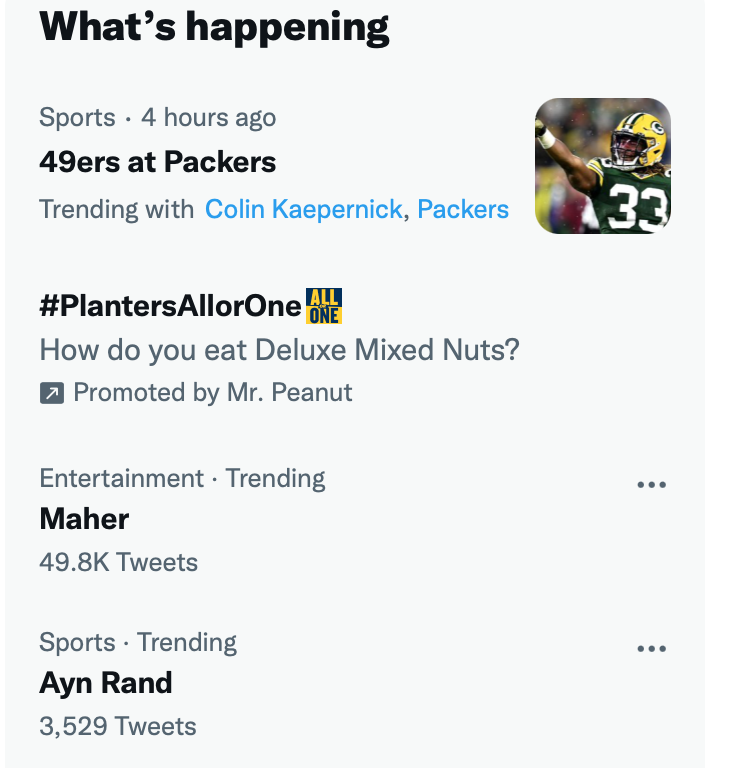From "How Based is Grok 3?" — the new episode of the NYT podcast "Hard Fork" (audio and transcript at that link, to Podscribe).
February 22, 2025
"My actual fantasy for like the rise of super intelligence is that when you do train it on all human knowledge, it is essentially incapable of having anything other than per progressive values."
From "How Based is Grok 3?" — the new episode of the NYT podcast "Hard Fork" (audio and transcript at that link, to Podscribe).
November 30, 2024
I created a new tag this morning and I noticed an old tag that I can never use anymore.
The old tag: "Written strangely early in the morning." There's no earliness in the morning that can be strange anymore. I used to think it strange to put up the first post in the 4-o'clock hour, but now, it would only be strange if I put up the first post before midnight, and that wouldn't be "morning" yet — no "a.m." The last post in this once-important tag was January 23, 2022 — "Why Ayn Rand is trending on Twitter under the heading 'Sports.'" — published at 3:10 a.m. Yes, that seemed notably early, 3 years ago. But now, when I wake up, feeling refreshed after what seems like a long sleep, and I look at the iPhone hoping it's not too early — which wouldn't be strange at all — I'm pleased if I see it's at least 3 a.m. Yesterday, when I looked — ready to leap out of bed — it was only 12:35 a.m. There are so many old posts with that tag! Here's the first one, in my first year of blogging, 2004: "Did you see that the first post today has a 4:33 a.m. timestamp? And yesterday's was 5:02? My two-hour 8 a.m. class has completely transformed my biorhythms, apparently. I was already a morning person, but this is a bit eerie. At least the NYT is already here at that hour...." That was 20 years ago, back when "the NYT" referred to a folded paper concoction stuffed in a blue plastic bag.
August 30, 2024
"And what I realized was that this was a moment that could only happen on Donahue. It was a moment that I don't think ever would've happened..."
Says Michael Barbaro, on today's episode of the "Daily" podcast, "What Phil Donahue Meant to Me" (link goes to the Podscribe transcript, which includes the audio).
May 30, 2024
"Understanding racialized space in architecture."
We see the mayor of West Hollywood trying to explain how architecture — which he pronounces "architexture" — has to do with race and gender.WATCH: The *very real* mayor of West Hollywood attempts to explain—to an increasingly hopeless @BenKawaller—the epidemic of “racialized” and “gendered architecture” in his city.
— The Free Press (@TheFP) May 29, 2024
Get more of “Ben Meets America!”—West Hollywood edition: https://t.co/yGvWguqS4x pic.twitter.com/4Npwfh0DUf
May 19, 2024
"Coppola has been unable to find a studio buyer for the movie and it’s clear why: 'Megalopolis' is likely to confuse and divide mainstream audiences."
There is nothing in Megalopolis that feels like something out of a “normal” movie. It has its own logic and cadence and vernacular. The characters speak in archaic phrases and words, mixing shards of Shakespeare, Ovid, and at one point straight-up Latin. Some characters speak in rhyme, others just in high-minded prose that feels like maybe it should be in verse. At one point, Adam Driver does the entire “To be or not to be” soliloquy from Hamlet. Why? I’m not exactly sure. But it sure sounds good....
Watch out for mainstream disaffection based on the fact that this movie contains traces of Ayn Rand:
April 7, 2024
"After I mentioned that I was a writer—though I presented myself as a writer of teleplays instead of novels and articles such as this one..."
Writes Gary Shteyngart, in "Crying Myself to Sleep on the Biggest Cruise Ship Ever/Seven agonizing nights aboard the Icon of the Seas" (The Atlantic).
September 5, 2023
"The thirty years since the release of 'Heathers' have solidified its legacy... Though J.D. emerges at first as a sensitive alternative to the football-playing lunkheads of Westerberg High..."
Writes Naomi Fry, in "'Heathers' Blew Up the High-School Comedy/The 1989 cult classic ushered in a darker, weirder, more experimental era for teen movies" (NYT).
July 2, 2023
"Ann! I saw video of naked bike riders down by the State Capitol bldg. True?"
4:38 — "That's brand new. I'm shocked as shit," says a black man, laughing. I ask him some questions about why he's shocked [by the Silent Majority Walk] and try to find out if he might perhaps actually be a Walker supporter himself.
5:54 — We hear a hubbub and I realize "These are the naked bike riders!" They ride by chanting "Less gas, more ass." I continue my discussion with the shocked-as-shit guy, who declares "That's America! That's America! That's the freedom!"
May 21, 2022
50 years ago today: "ROME, MAY 21—Michelangelo's Pieta, one of the world's most celebrated sculptures, was severely damaged today when a man attacked it with a hammer in St. Peter's Basilica."
"Hundreds of Whitsunday worshipers, pilgrims and tourists watched in horror as a young man with long reddish hair and a beard pushed into the side chapel to the right of the main entrance to St. Peter's, where the Pieta is on display over, an altar. He climbed over a marble balustrade, went up the stairs to the platform on which the sculpture rests, pulled out a hammer from under a raincoat he had over his arm and started battering the marble, shouting, 'I'm Jesus Christ.' The blows shattered the left arm of the figure of the Virgin Mary in the marble group and also chipped the nose, the left eye and the veil covering the hair... The assailant, who was identified as Laszlo Toth, 33 years old, of Sydney, Australia, was able to strike four or five hammer blows amid the gasps and shouts of the crowd before an Italian fireman ran up to him and pulled him down by his hair.... A Vatican spokesman said later that Mr. Toth had told Archbishop Benelli in English: 'If you kill me, so much the better, because I'll go straight to heaven.' The Hungarian‐born Mr. Toth had been living in Rome for some time and had acquired some notoriety for bizarre conduct. In an interview last November, II Messaggero of Rome presented him as a 'local character of sorts,' quoting Mr. Toth as saying that he was a geologist and had left Australia two years ago to return to Europe because 'I have seven mysteries to reveal.'"
The NYT reported, 50 years ago.
We're told that Pope Paul inspected the damage, knelt and prayed in front of it, and was overheard saying "Also most serious moral damage."

In the 1970s, Novello started to write letters to famous people under the pen name of Lazlo Toth (after Laszlo Toth, a deranged man who vandalized Michelangelo's Pietà in Rome). The letters, written to suggest a serious but misinformed and obtuse correspondent, were designed to tweak the noses of politicians and corporations. Many of them received serious responses; Novello sometimes continued the charade correspondence at length, with humorous results. The letters and responses were published in the books The Lazlo Letters, Citizen Lazlo!, and From Bush to Bush: The Lazlo Toth Letters.
Here's the Wikipedia article for Lazlo Toth, the vandal:
He was not charged with a criminal offence after the incident, but was hospitalized in Italy for two years. On his release, he was immediately deported to Australia.... In June 1971 he moved to Rome, Italy, knowing no Italian, intending to become recognized as Christ.
The correct spelling of the name is Laszlo Toth.

Toth is on Wikipedia's "List of people claimed to be Jesus."
January 23, 2022
Why Ayn Rand is trending on Twitter under the heading "Sports."
I thought this was odd:
But I clicked through and saw that it was no mistake:
Yes, I blogged Aaron's bookshelf gesturing — back on January 4th... in happier days....
Aaron Rodgers points out his copy of Atlas Shrugged by Ayn Rand to Eli and Peyton Manning during Monday Night Football. pic.twitter.com/2qSOcSSb3m
— The Recount (@therecount) January 4, 2022
January 4, 2022
Aaron Rodgers explains everything.
Aaron Rodgers brags he has Ayn Rand’s “Atlas Shrugged” on his bookshelf.
— Marcus Hayes (@inkstainedretch) January 4, 2022
Explains everything. pic.twitter.com/fYHmGeY7FX
August 24, 2020
Here's the post that is the reason Ayn Rand is trending on Twitter right now.
Top 7 Warning Signs In a Man's Bookshelf:
— Jess McHugh (@MchughJess) August 24, 2020
1. A Dog-eared copy of Infinite Jest
2. Too Much Hemingway
3. Any amount of Bukowski
4. AYN. RAND.
5. Goethe
6. "Lolita is my favorite book."
7. "'Fathers and Sons' Is my favorite book."
I'm sure many of you can write better "Top 7 Warning Signs In a Man's Bookshelf" lists!
July 10, 2020
That last post finally pushed me over the line to create a tag I've been thinking about for a while...
The pressure was building after yesterday's post about Seattle's effort to teach its employees about their own "Internalized Racial Superiority," which is "defined by" — among other things — "individualism."
What pushed me over the line into new tag creation this morning was a criticism of women who fall into the "trap" of talking about their individual struggle with motherhood.
I went back into the archive and added the tag to a few old things:
June 19, 2020 — This is a quote from a review of the book "White Fragility": "'I am white and am addressing a common white dynamic,' DiAngelo explains. 'I am mainly writing to a white audience; when I use the terms us and we, I am referring to the white collective.' It is always a collective, because DiAngelo regards individualism as an insidious ideology. 'White people do not exist outside the system of white supremacy,' DiAngelo writes, a system 'we either are unaware of or can never admit to ourselves.'"
November 29, 2015 — I quoted the Tom Wolfe essay, "The 'Me' Decade and the Third Great Awakening":
August 21, 2019
"If there is a single micro-genre of American journalism more nauseating than the 'Jay-Z and Beyonce woke discourse circa 2007-2019,' I can't think of it."
From "Jay-Z's cardboard corporate activism" by Matthew Walther (The Week).
Interesting to call Beyonce's lyrics "Randian." I had to look up "yellow bone it." From the annotations at Genius.com:
“Yellow bone” refers to being black but having light-skin.... Bey’s considered “yellow-boned” opposed to “red-boned” because her complexion has more of a “honey” tone to it, and is thus “yellow.” Jay Z referred to Beyonce as a “high yellow broad” on his 2009 song “Off That.”What does Ayn Rand say about race? From Rand's "Virtue of Selfishness":
Racism is the lowest, most crudely primitive form of collectivism. It is the notion of ascribing moral, social or political significance to a man’s genetic lineage — the notion that a man’s intellectual and characterological traits are produced and transmitted by his internal body chemistry. Which means, in practice, that a man is to be judged, not by his own character and actions, but by the characters and actions of a collective of ancestors.I'm not going to go any further into the study of whether Beyonce lyrics accord with Randian philosophy! If my head were full of Beyonce lyrics — which maybe they would be if my last 10 years were my teenage years — I might want to sort through whether Beyonce-ism is as left-wing as left-wing commentators had been presenting her up until this football foofaraw. But my teenage years were in the 60s. My head is full of Dylan lyrics. And I've already blogged about whether Dylan is as left-wing as some people seem to think or whether he's really somehow right-wing. So that's it for me for now about the political meaning of musical artists.
Racism claims that the content of a man’s mind (not his cognitive apparatus, but its content) is inherited; that a man’s convictions, values and character are determined before he is born, by physical factors beyond his control. This is the caveman’s version of the doctrine of innate ideas — or of inherited knowledge — which has been thoroughly refuted by philosophy and science. Racism is a doctrine of, by and for brutes. It is a barnyard or stock-farm version of collectivism, appropriate to a mentality that differentiates between various breeds of animals, but not between animals and men.
Like every form of determinism, racism invalidates the specific attribute which distinguishes man from all other living species: his rational faculty. Racism negates two aspects of man’s life: reason and choice, or mind and morality, replacing them with chemical predestination....
August 5, 2019
"But this summer Ivanka transformed into someone entirely alien and new. She’s a frum Donatella Versace, her platinum hair parted severely down the middle..."
A couple snippets from the long New York Magazine article, "Ivanka Aeternum After the White House, she probably can’t go back to the city that made her. So she has cannily devised another exit strategy" by Vanessa Grigoriadis."
"She’s a frum Donatella Versace...." I know Donatella Versace, the 64-year-old fashion mogul who has aged quite weirdly... but what is "frum"?
Wikipedia says:
Frum (Yiddish: פֿרום, lit. 'religious', 'pious') is a word that describes Jewish religious devotion.... The term connotes the observance of Jewish religious law in a way that often exceeds its bare requirements.... Frum can be used in a negative sense for 'hypocritically pious', 'holier-than-thou', 'sanctimonious'; or in a positive sense for 'pious', 'devout', 'God-fearing', and 'upright'....
June 29, 2019
"AGE 24/'Atlas Shrugged'/BY AYN RAND/'Marvel at the profundity of its objectivist themes — then, in a few years, marvel at your naivete."
The book that caught my eye and that I downloaded from Kindle is the one chosen for age 92:
“Nothing to be Frightened Of”The one chosen for my age, 68, is something I've already read, “The Year of Magical Thinking” by Joan Didion ("Grief can make you feel like you’re losing your mind. That’s normal").
BY JULIAN BARNES
Don’t avoid the big questions of life and death and faith: Tackle them straight on with help from some of the greatest thinkers.
And, no, I've never read "Atlas Shrugged." I tried a little, but I have to like the sentences. I'm a sentences reader.
That reminds me, I wanted to recommend this Malcolm Gladwell podcast that has a lot to say about the kind of people who are slow readers:
The Tortoise and the HareGladwell is himself a "tortoise" — a slow reader — and he doesn't like the way his kind are disadvantaged on the LSAT.
A weird speech by Antonin Scalia, a visit with the some serious legal tortoises, and a testy exchange with the experts at the Law School Admissions Council prompts Malcolm to formulate his Grand Unified Theory for fixing higher education.
A "tortoise"-type reader is not going to do well with "Atlas Shrugged"!
By the way, Gladwell talks about the condition of being a slow reader and a fast writer. I have that too. It's why blogging works well for me. I can find and isolate the sentences I find rich and readable — slowly readable — and I can flow very quickly writing about them. In this light, you can see that this tortoise/hare thing is not binary. There may be tortoises and hares, but there are also "hortoises" and "tares." If it's just tortoises and hares, it might be easy to say, yeah, it's just that some people are smarter than others. But if you see reading and writing (or reading and analyzing) as separate axes, with fast to slow on both, people are more complexly differently abled. Diagram to come....
ADDED: Oh, no, no, no... my idea of a diagram with axes and quadrants is defective. I had to try to draw it to see the problem!

Reading does not progress to writing the way slow progresses to fast. Please suggest a way I can draw this idea!
AND: Allison explained the solution and, with her help, I easily got it right:

January 20, 2019
The man in the middle.
Said Chase Iron Eyes, an attorney with the Lakota People’s Law Project, quoted in "'It was getting ugly': Native American drummer speaks on the MAGA-hat-wearing teens who surrounded him" (WaPo).
I am touched by the charity of "They were rambunctious."
But I'm only guessing at what the video sounds like. I cannot bring myself to play it.
[A] Native American man steadily beats his drum at the tail end of Friday’s Indigenous Peoples March while singing a song of unity urging them to “be strong” in the face of the ravages of colonialism that now include police brutality, poor access to health care and the ill effects of climate change on reservations.The phrase "man in the middle" resonates with me. I will never forget the day — at the rambunctious Wisconsin protests — when Meade encountered The Man in the Middle:
Surrounding him are a throng of young, mostly white teenage boys, several wearing “Make America Great Again” caps, with one who stood about a foot from the drummer’s face also wearing a relentless smirk.
Nathan Phillips, a veteran in the indigenous rights movement, was that man in the middle....
[O]ne man — who did not agree with the protesters — decided he would occupy the central spot. To the consternation of the others, he invited people to come talk to him one-on-one....Video at the link.
I started to imagine Wisconsinites coming back to the building every day, talking about everything, on and on, indefinitely into the future. That man who decided to hold dialogues in the center of the rotunda is a courageous man. But it isn't that hard to be as courageous as he was. In the long run, it's easier to do that than to spend your life intimidated and repressed. That man was showing us how to be free. He was there today, but you — and you and you! — could be there tomorrow, standing your ground, inviting people to talk to you, listening and going back and forth, for the sheer demonstration of the power of human dialogue and the preservation of freedom.
Looking for posts about that man in the middle, I see that in 2013 I wrote about the phrase "man in the middle" as it appears in "Atlas Shrugged." Ayn Rand wrote:
There are two sides to every issue: one side is right and the other is wrong, but the middle is always evil. The man who is wrong still retains some respect for truth, if only by accepting the responsibility of choice. But the man in the middle is the knave who blanks out the truth in order to pretend that no choice or values exist, who is willing to sit out the course of any battle, willing to cash in on the blood of the innocent or to crawl on his belly to the guilty, who dispenses justice by condemning both the robber and the robbed to jail, who solves conflicts by ordering the thinker and the fool to meet each other halfway. In any compromise between food and poison, it is only death that can win. In any compromise between good and evil, it is only evil that can profit. In that transfusion of blood which drains the good to feed the evil, the compromiser is the transmitting rubber tube.I said:
Is this cranking you up? It doesn't work on me. I think moderation is a virtue, but in this imagery, virtue is blood, evil is poison, and moderation is a tube. You're supposed to feel this as a flashy display of reason, but it's full of emotional bluster and heavily reliant on metaphor. I'm being asked to regard myself as a rubber tube. No....I was talking about that Ayn Rand passage because Ted Cruz read it — along with "Green Eggs and Ham" — out loud while filibustering in the Senate. The phrase "the man in the middle" grabbed me, and I wrote:
I'm not accepting this picture of life in terms of people with good blood and people with bad blood and everyone else as a bunch of tubes conducting a big old transfusion that's just got to stop....
"Man in the middle" is a phrase that feels like a call to action, because it's a phrase Meade and I have used when we talk about a man we saw as a hero for sitting down in the middle of the Wisconsin Capitol rotunda, in a crowd of sign-carrying, noisy partisan protesters, inviting them to speak, one-on-one, with someone who was not in agreement with the crowd....
Talking, indefinitely into the future... in the middle of a government building. That's what Ted Cruz is doing, but not in the moderate, surely-we-all-can-get-along mode. He's on one side, and he's reviling anyone in the middle. He's reading from Ayn Rand, saying that the moderate is evil, because the moderate is the knave who blanks out the truth in order to pretend that no choice or values exist.
In any compromise between food and poison, it is only death that can win. Oh? But would you like it it in a box? Would you like it with a fox? Would you like it in a house? Would you like it with a mouse?

UPDATE: I still haven't watched the video, but I have watched Scott Adams's strong apology for portraying the Catholic schoolboys in a negative light, and Adams describes the extended video in detail. So check out my new post, which includes quotes from Adams's description.
August 27, 2018
"There is a whole literary subgenre now that trades in this sort of deferred pleasure – books with subtitles like 'My year of reading' or 'Unpacking my library' or..."
From "Smart for our own good" by Kristen Roupenian. You remember Kristen Roupenian, she of "Cat Person."* The book under review is "Sharp: The women who made an art of having an opinion."
Roupenian's "dream version" of herself — what she pictured as she was growing up — had a particular mode of conversation ("drily witty, slightly abrasive"), a specified item of clothing ("a black turtleneck"), and a visualizable pile of books ("yellowed paperback copies of lesser-known works by Susan Sontag, Joan Didion and Hannah Arendt").
So what was your dream version of yourself? Even if you weren't, in your real youth, thinking in terms of a particular mode of conversation, a specified item or items of clothing and a visualizable pile of books, please play my little game. It's like Clue — Colonel Mustard in The Conservatory with the lead pipe.
Also, chez Meadhouse, we just had a long conversation about this:
Perhaps the finest moment in Sharp... is Dorothy Parker’s parodic takedown of F. Scott Fitzgerald:That's a great Twitter game. Maybe you won't play my "Dream Version" game because "Describe yourself like a male author would"** is too deliciously tempting. But my game is easier. Can't go wrong. How well do you think Dorothy Parker did at her parody? I thought the repetition of "nineteen year-old" was hilarious, but the really puzzling part is the point of view: "All that you could see of her" has a "you" standing somewhere, eyeing and judging the young woman, and "your" view was obscured by the side of the bathtub so that you could only see as far down her face as her eyes, and then in the next sentence, "you" could see her mouth. Is that Dorothy's lapse or is she skewering a foible of F. Scott's?
Rosalind rested her nineteen year-old elbows on her nineteen-year-old knees. All that you could see of her, above the polished sides of the nineteen-year-old bathtub, was her bobbed, curly hair and her disturbing gray eyes. A cigarette drooped lazily from the spoiled curves of her nineteen-year-old mouth.Yes, Parker anticipated the recent, scathing Twitter thread “Describe yourself like a male author would” by almost a hundred years.
And here's Nora Ephron's parody of Ayn Rand:
Twenty-five years ago, Howard Roark laughed. Standing naked at the edge of a cliff, his face painted, his hair the colour of a bright orange rind, his body a composition of straight, clean lines and angles, each curve breaking into smooth, clean planes, Howard Roark laughed.Hey: Describe yourself like a female author would. Another game.
Roupenian knocks "Sharp" as "essentially, of a series of positive reviews of well-respected writers":
[I]f everyone in your audience already agrees with what you’re saying in your essay, then writing it is a waste of time. In the case of Sharp, readers would have been pleasurably surprised to encounter the name of a writer whose inclusion felt even a little bit risky, even disagreeable: the aforementioned Ayn Rand, say, or Camille Paglia, or Ayaan Hirsi Ali.Roupenian uses words like "well-respected," "risky," and "agrees"/"disagreeable" to stand in for any mention of politics or ideology. Was that active sanitation or really the way Roupenian thinks (that is, like an artist***? The latter, I hope.
In this sense, Sharp is a book that hasn’t learnt the lesson it tries to impart. It is disconcerting to read a book that focuses on so many women who pushed intellectual boundaries, yet which stays so squarely within the confines of conventional wisdom when it comes to the writers it chooses to assess.____________________
* Looking for a link about "Cat Person," I found, from last May, "Kristen Roupenian, author of Cat Person, is dating a woman." We got so excited about the story of a woman going through with having sex with a man when she didn't really want it. Roupenian said it was "strange to suddenly be the spokesperson for terrible straight sex."
** For a description of the origin of this meme, read "‘Describe Yourself Like a Male Author Would’ Is the Most Savage Twitter Thread in Ages/The challenge is a fierce indictment of what happens when you try to write a character you don’t respect or understand."
A male author is insisting that he is living proof that it's possible for a male author to write an authentic female protagonist.— Gwen C. Katz (@gwenckatz) March 30, 2018
Here's a quote from his first page. pic.twitter.com/f6d5bN2EHq
*** I always quote Oscar Wilde for this proposition: "Views are held by those who are not artists." It gives loft to my own aversion to politics.
April 11, 2017
"The new age of Ayn Rand: how she won over Trump and Silicon Valley."
... Trump’s offer to the electorate in 2016 was not a promise of an unfettered free market... So why does Trump claim to be inspired by her? The answer, surely, is that Rand lionises the alpha male capitalist entrepreneur, the man of action who towers over the little people and the pettifogging bureaucrats – and gets things done....
Which brings us to the new wave of Randians... the princes of Silicon Valley....
"Now [Hillary Clinton] can add 'fashion muse' and 'footwear model' to the list [of important titles], thanks to Katy Perry, who designed a pair of pumps in her honor, dubbing them The Hillary."
Effuses People Magazine's "Style" section.
Speaking of style, what atrocious writing style! When I hear "got her hands on a pair of baby pink pumps," I'm the kind of person who immediately wants to say: and got her feet on a pair of adult blue gloves. And when I hear "more than happy," I go looking for the George Carlin clip:
ADDED: I got to that link via Drudge, who follows it with what I think is a non-accidental line-up of links:

Thanks to Fernandinande (commenting in the café post below) for prompting me to acknowledge Drudge and to perceive intentional drudgtaposition. Notice how the word "pump" appears twice. Well, what do you think? Intentional comic juxtaposition? Here's another way to frame the screenshot. What do you think of this?

You've got the 2 images of something normally unseen. We peer in utero at unborn babies. (What are they doing?) And we gawk endlessly at a belly a man had dressed to cover. Bracketing these 2 images of human beings who did not choose self-exposure are 2 women who dearly want and demand our attention, who pose with forthright willingness for the camera: 1. Hillary Clinton, positioning herself like a cute-girl marionette, displays pop-star-branded candy-colored shoes, and 2. Ayn Rand stares at us in utterly serious black and white, imposing her imperious will that says we must see her as both distinctly beautiful and absolutely devoid of girlishness.





